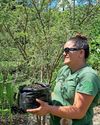
IN ST IVES, HERRING GULLS dive-bomb for ice-cream and rib boats stalk the bay. I am listening to Lizzy, who lives in a van. As a child she lived on the hill in her grandmother's house. Her grandmother had five bedrooms and six children. When she died, the house was divided between them.
None could afford to buy the others out on a native St Ives salary, so Lizzy rented in the town: pretty cottages, and bungalows with views. She worked in retail and kitchens. When she had a partner, she had money to spend: a good life in a town that looks like a storybook.
She lost her partner and, two years ago, her bungalow became an Airbnb. With 18,000 on the waiting list, the council told her to go to a homeless shelter. Instead, she bought a van from a friend, insulated it and put a mattress in the back. She joined a spa to use the washing facilities, and she meets second homeowners there. "And they go, 'Do you live here?' I say, 'I live in a van.' And they go, 'Where's that?' And I go, 'I live in a van. You know - those things on wheels?"" All tourists have an obliviousness, but it is particularly marked in St Ives.
They park Ferraris in loading bays meant for tradespeople, or stare at the sky. Braver ones wrestle with fish: I met a man on the quay as the flounder he had caught died, bloodied, in his arms.
St Ives is a seasonal town. Lizzy works 12-hour shifts in summer and saves money; she spent last winter in Thailand. She wishes she had bought the van years ago. "I was surviving, just getting by. Whereas now I live my life. It's given me the freedom to be able to save the money to go travelling and do the things I want to do. I'll probably end up in the future looking at something like a bit of land in Portugal." She will, she adds carefully, share it with Portuguese natives. She wouldn't inflict her experience of social cleansing elsewhere.
This story is from the August 16, 2024 edition of The Guardian Weekly.
Start your 7-day Magzter GOLD free trial to access thousands of curated premium stories, and 9,000+ magazines and newspapers.
Already a subscriber ? Sign In
This story is from the August 16, 2024 edition of The Guardian Weekly.
Start your 7-day Magzter GOLD free trial to access thousands of curated premium stories, and 9,000+ magazines and newspapers.
Already a subscriber? Sign In

Catharsis Journalist and novelist Omar El Akkad castigates complacent liberal responses and western hypocrisy over the war in Gaza
'Where's the Palestinian Martin Luther King?\" Journalist and novelist Omar El Akkad has heard this question a lot lately, \"the implicit accusation [being] that certain people are incapable of responding to their mistreatment with grace, with patience, with love, and that this incapacity, not any external injustice, is responsible for the misery inflicted upon them\".

The US's former friends need to realise the old global order is over
A resonant phrase during Donald Trump's first administration was the advice to take him \"seriously, but not literally\".

Healthcare workers are protected under international law yet hundreds were detained during the war. Here, some of Gaza's most senior doctors speak out 'No rules': tortured, beaten and humiliated in Israeli detention
Dr Issam Abu Ajwa was in the middle of an emergency procedure at al-Ahli Arab hospital in central Gaza when soldiers came for him.

'Why aren't there Oscars or Baftas for what we do?'
From Matilda to Dear England, choreographer Ellen Kane's work has lit up show after show. It's time this art received proper recognition, she says

Print, clone, repeat
How do you follow an Oscar winner like Parasite? In Bong Joon-ho's latest film, a screwball sci-fi, Robert Pattinson keeps dying and being 'reborn'

Star chamber Pharoah's tomb is find of the century
It was when British archaeologist Dr Piers Litherland saw that the ceiling of the burial chamber was painted blue with yellow stars that he realised he had just discovered the first tomb of an Egyptian pharaoh to be found in more than a century.

Can an extinct tree be brought to life?
Abotanical discovery gives hope for resurrecting Rapa Nui's toromiro tree with 'experimental saplings'

a In London, potent mix of religion and rightwingers
The splendours of the Parthenon, Colosseum and Great Pyramid of Giza were in stark contrast to the utilitarian conference centre in London's docklands, but they were there to make a point.

Inflection point Bolsonaro faces 40 years in jail but holds out for Trump lifeline
At the height of Jair Bolsonaro's haywire presidency, Brazilian activists projected their deepest desire on to the Tower of London, where Guy Fawkes once languished after plotting to blow up parliament and assassinate the king.

Shaking off inertia, civic opposition to Trump's cuts gathers pace
On a bright winter's day last week, a group of protesters fanned out along a palm-tree-lined thoroughfare in the picturesque city of Palm Desert to demand that their Republican congressman stand up to Donald Trump and Elon Musk's slash-and-burn effort to reshape the US government.
